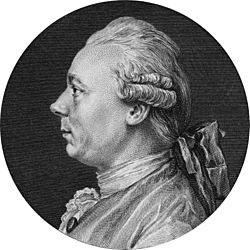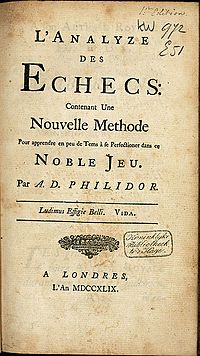Philidor facts for kids
François André Danican Philidor (born in Paris in 1726, died in London in 1795) was a very famous chess player and a talented composer of light opera music. Many people think he was the best chess player of his time. He came from a family of musicians who worked for the French King's court. Philidor also wrote an important book about chess that helped many players for a long time.
Contents
Philidor's Early Life
Philidor's family name was originally Duncan, from Scotland. They later moved to Brittany. Their family name then became Danican. In the 1600s, after they started working for King Louis XIII, they changed their name to Philidor. This was to honor an Italian court musician named Filidori.
Young Philidor started learning music when he was very young. He also learned to play chess from musicians during breaks between their performances. He became very good at both music and chess, though music was his main focus at first.
Philidor took chess lessons from the best French chess master of that time, a man named Légall. After three years, Philidor was just as good as his teacher. In 1746, he found himself in Rotterdam without money. This happened after a music tour ended sadly. He started playing chess for money to support himself. In 1747, he traveled to London to play a match against the strongest English player, and Philidor won. This marked the start of his new life. He played chess in London and wrote light operas for the Comédie-Française theater in Paris.
Philidor's Chess Career
Philidor began playing chess regularly around 1740 at the famous Parisian Café de la Régence. He even played there with his friend, Mr. Benjamin Franklin, who was from 'New England'.
When Philidor was 21, he met Philip Stamma, a chess player and translator from Syria. Philidor won their match easily. At 29, he beat his old teacher, Légall, in another match. Sadly, we don't have records of these early games. However, we do have many games from his later career.
As a teenager in 1744, Philidor could play two chess games at the same time while simultaneously blindfold. This means he played without looking at the board! Later, in Berlin, he played three blindfold games. He gave these amazing shows many times. People thought this was a miracle, even though an Italian priest named Saccheri had done it before.
His Famous Chess Book
In 1749, Philidor published a chess book that made him very famous. The first edition, written in French, listed many wealthy sponsors who helped pay for it. An English version, called Chess Analysed, came out in 1750. He updated and added to the book twice, in 1777 and 1790.
Over the years, the book was a huge success. By 1871, it had been printed about 70 times and translated into English, German, Russian, and Italian. Eventually, it had over a hundred editions in ten different languages!
Philidor's Chess Ideas
One expert said that Philidor's book, Analyse, completely changed how people thought about chess. For the first time, the main rules of chess were explained clearly. He especially taught players how to use their pawns correctly. His book included games to show his ideas and also had amazing analysis of endgames.
Philidor's famous saying was "Les pions sont de l'âme du jeu," which means "Pawns are the soul of chess." This motto is still taught to young chess players today. It means that the way your pawns are set up gives the game its long-term plan and affects how the game will go.
Philidor’s book was the first to give:
- Detailed notes on how to play the middle part of a chess game.
- A complete plan for chess strategy.
- Ideas like the blockade (stopping enemy pieces), prophylaxis (preventing enemy plans), and how important it is for pawns to be able to move freely.
Philidor also studied chess endgames, which are the final stages of a game. His book gave very accurate information about them. An important endgame position he wrote about is still called the Philidor position.
He also gave his name to one of the basic chess openings, called Philidor's Defence.
Philidor became well-known in high society in both France and England. Later, in 1760, he married a singer and they had seven children. Philidor played chess at the Café de la Régence in Paris, and at the Salopian Coffee-house and Parsloe's chess club in London.
Philidor's Music
People at the time found it hard to believe that Philidor could be so good at two very different things like chess and music, but he was! His work on comic opera was excellent. He wrote 25 such operas, and worked with others on four of them, including Rousseau.
His opera Tom Jones (1765) was considered one of the best works in the theater. His opera Ernelinda, Princess of Norway (1766) pleased King Louis XV so much that the King gave Philidor a special payment from his own money. However, people in England did not pay much attention to his music. After 1792, Philidor never returned to France. The French Revolution made his connections to the royal family dangerous for him.
Philidor died in 1795. The Comédie-Française theater held a special concert to raise money for his widow.
 | Audre Lorde |
 | John Berry Meachum |
 | Ferdinand Lee Barnett |



